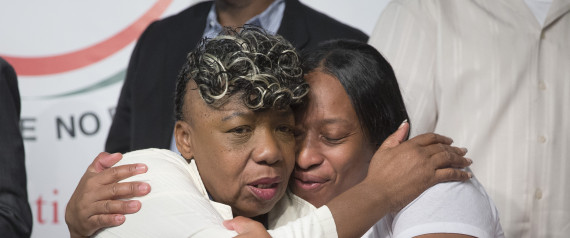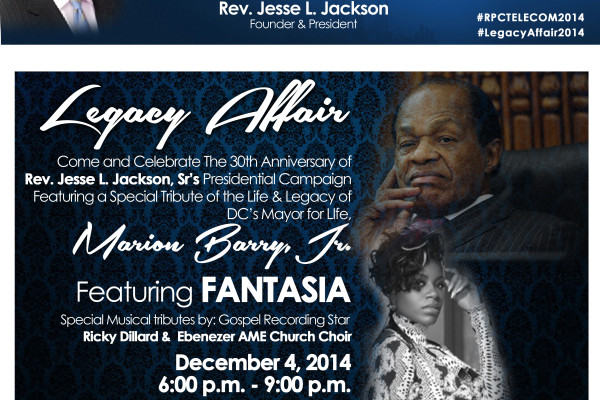The mother of a New York man who was placed in a chokehold while in police custody says her first words on hearing his death had been ruled a homicide were “Thank you, Jesus.”
Eric Garner’s mother, Gwen Carr, said Saturday she was grateful for the medical examiner’s report saying Garner’s death was caused by a banned police maneuver.
Carr and other relatives joined the Rev. Al Sharpton in Harlem.
Sharpton announced an Aug. 23 march across the Verrazano Bridge between the boroughs of Brooklyn and Staten Island to demand justice for Garner.
Garner died July 17 on Staten Island.
His videotaped arrest and final pleas of “I can’t breathe!” sparked an outcry against the police.
Sharpton says the Staten Island district attorney should now move toward an arrest.
THIS IS A BREAKING NEWS UPDATE. Check back soon for further information. AP’s earlier story is below.
New Yorkers enraged by a man’s death in police custody see a medical examiner’s ruling that blames a prohibited chokehold as a clear indication the officers involved should face criminal charges.
“They killed somebody,” neighbor Charlene Thomas said after the city’s medical examiner deemed Eric Garner’s death a homicide. “Why? Because they’re cops, they gotta get away with this?”
Garner was killed by neck compressions from the chokehold and “the compression of his chest and prone positioning during physical restraint by police,” city medical examiner spokeswoman Julie Bolcer said Friday.
Ramsey Orta, a friend of Garner’s who videotaped his struggle with police, said the medical examiner’s ruling wasn’t surprising.
“I knew that was the cause because I saw it,” he said. “Now somebody should get charged.”
Asthma, heart disease and obesity were contributing factors in the death of the 43-year-old Garner, a 6-foot-3, 350-pound father of six, according to the medical examiner’s office.
His videotaped arrest and final pleas of “I can’t breathe!” sparked outrage and led to the overhaul of use-of-force training for the nation’s largest police department.
The confrontation between the white police officer who used the chokehold, Daniel Pantaleo, and Garner, who is black, prompted calls by the Rev. Al Sharpton for a federal civil rights investigation.
Garner’s family will join Sharpton on Saturday to address the medical examiner’s ruling, a spokeswoman said.
The finding increases the likelihood that the case will be presented to a grand jury to determine whether Pantaleo or any other officers involved in the confrontation will face criminal charges.
Pantaleo’s attorney, Stuart London, declined to comment.
Garner’s wife, Esaw Garner, told the Daily News, “Thank God the truth is finally out.”
Mayor Bill de Blasio extended his sympathies to Garner’s family in a statement and pledged to continue repairing the relationship between minority communities and the New York Police Department.
“I’ve said that we would make change, and we will,” he said.
Chokeholds are prohibited by the NYPD, but partial video of the July 17 confrontation shows an officer placing a chokehold on Garner, who was being arrested on suspicion of selling untaxed, loose cigarettes. Garner then apparently loses consciousness.
A spokesman for Staten Island District Attorney Daniel Donovan said prosecutors were still investigating the death and awaited a full autopsy report and death certificate from the medical examiner. Donovan will have to determine whether to empanel a grand jury and charge officers in Garner’s death.
Federal officials are monitoring the investigation, a Department of Justice spokeswoman said, adding that the department has not begun its own inquiry.
Police Commissioner Bill Bratton said officials were aware of the medical examiner’s findings and the department is cooperating with prosecutors. He has said the NYPD’s use-of-force training is lacking and has pledged to retrain all 35,000 officers.
Pantaleo was stripped of his gun and badge pending the investigation, and another officer was placed on desk duty. Two paramedics and two emergency medical technicians were suspended without pay.
The president of the powerful Patrolmen’s Benevolent Association, Patrick Lynch, expressed his sympathies to Garner’s family but noted Garner “was a man with serious health problems.”
“We believe, however, that if he had not resisted the lawful order of the police officers placing him under arrest, this tragedy would not have occurred,” he said.
Source: http://www.huffingtonpost.com





